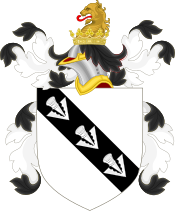Theodorick Bland (February 1663 – November 1700)[1] made a survey in 1693 of the Howson Patent, which is an area corresponding to present day Alexandria, Virginia.[2] He also made a survey for Williamsburg, Virginia in 1699.[3][4][5]

Bland was the oldest son of Theodorick Bland of Westover and Anna Bennett, the daughter of Governor Richard Bennett.[1][6] His brothers were Richard Bland (who was the great-grandfather of Chancellor Theodorick Bland) and John Bland .[1][6] Bland married Margaret Man and had two sons:[1]
- John Bland (born December 8, 1698); he married Ann West and had at least three children, John, Theodorick, and Mary.[1]
- Theodorick Bland, who died shortly after his father.[1]
When his father died in 1671, Bland inherited Westover Plantation and joined with his brother, Richard, in its ownership.[7] The brothers eventually conveyed 1,200 acres of the property to William Byrd I in 1688 for 300L and 10,000 pounds of tobacco and cask.[7] Byrd's grandson built a Georgian mansion there in the 1750s.
- ^ a b c d e f Hunter, Joseph (1895). "Bland". In Clay, John W. (ed.). Familiae Minorum Gentium. Vol. II. London: The Harleian Society. pp. 421–427.
- ^ John Alexander. Chapman & Alexander Families. Virginia Book Company. p. 101.
- ^ "Bounds of the Capitol and Prison". Colonial Williamsburg's Digital History Center Archive. April 11, 1943.
- ^ Great Britain Public Record Office; John William Fortescue (1908). Calendar of State Papers, Colonial Series. Longman, Green, Longman & Roberts.
- ^ Helen Bullock (April 12, 1938). "Sizes of Colonial Lots". Colonial Williamsburg's Digital History Center Archive.
- ^ a b Bland, Theodorick (1840). "Appendix". In Campbell, Charles (ed.). The Bland papers: Being a Selection from the Manuscripts of Colonel Theodorick Bland Jr. of Prince George County Virginia. Vol. I. Petersburg, Virginia: Edmund & Julian C. Ruffin. pp. 145–149.
- ^ a b Tyler, Lyon G. (January 1896). "Title of Westover". William and Mary College Quarterly Historical Magazine. 4 (3): 151–155. doi:10.2307/1914946. JSTOR 1914946. Retrieved December 11, 2010.